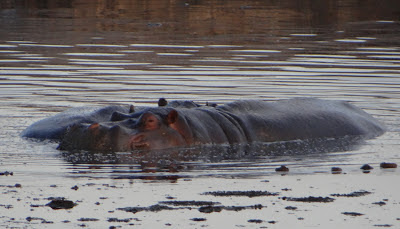Given the history of uncontrolled elephant hunting and poaching in Africa (the population has shrunk from 5 million in the 1930s to 500,000 today), it is amazing to find pockets where the animals are thriving. Do you see all the babies and youngsters in the picture below? Due to the lack of predators, the elephant population is exploding in some of Zimbabwe's national parks, and that is presenting a challenge.
Gonerazou National Park is home to 9000 elephants. The territory can support less than half that many. That means hungry elephants and other animals are deprived of their sustenance.
Not only do elephants eat a prodigous amount of food (they can clear an acre of small trees in two hours by knocking them over), but young males tend to take out their sexual frustration on trees, thrashing them with impunity. As Peter Allison says in his charming book, Whatever You Do, Don't Run: True Tales of a Botswana Safari Guide, if human male teenagers acted like adolescent elephants, global deforestation would be complete.
The owner of Chilo Gorge Safari Camp tells us that controlling the population is a challenge. Culling herds is a logistics nightmare. They have found that the best way to cull is to take out an entire family. Hunters first shoot the matriarch. The other elephants gather around to protect her, making easy targets. Afterwards, there is the challenge of disposing of dozens of carcasses...and the emotional toil it takes on the hunters. Culling is an awful task and hunters hate it.
 An alternative may be on the horizon. When we returned home, in my pile of mail was the On Wisconsin alumni magazine. In it was an article on birth control for elephants, An Elephant Never Begets.
An alternative may be on the horizon. When we returned home, in my pile of mail was the On Wisconsin alumni magazine. In it was an article on birth control for elephants, An Elephant Never Begets.A UW veterinary school graduate, Jeff Zuba of the San Diego Zoo Safari Park, has founded the Elephant Population Management Project. It seems impossible, but Zuba and his team perform vasectomies in the wild. What????
It turns out that only the alpha bull needs the knife. He is the only one who gets access to the females...so if his sperm is curtailed, the population should decline. A vasectomy doesn't change behavior or social status, so the bull will continue to dominate and prevent fertile males from mating with females. As Zuma says, "the big guy's back to normal, but shooting blanks."
We hope Zuba and his team will reach Gonerazou National Park soon.







